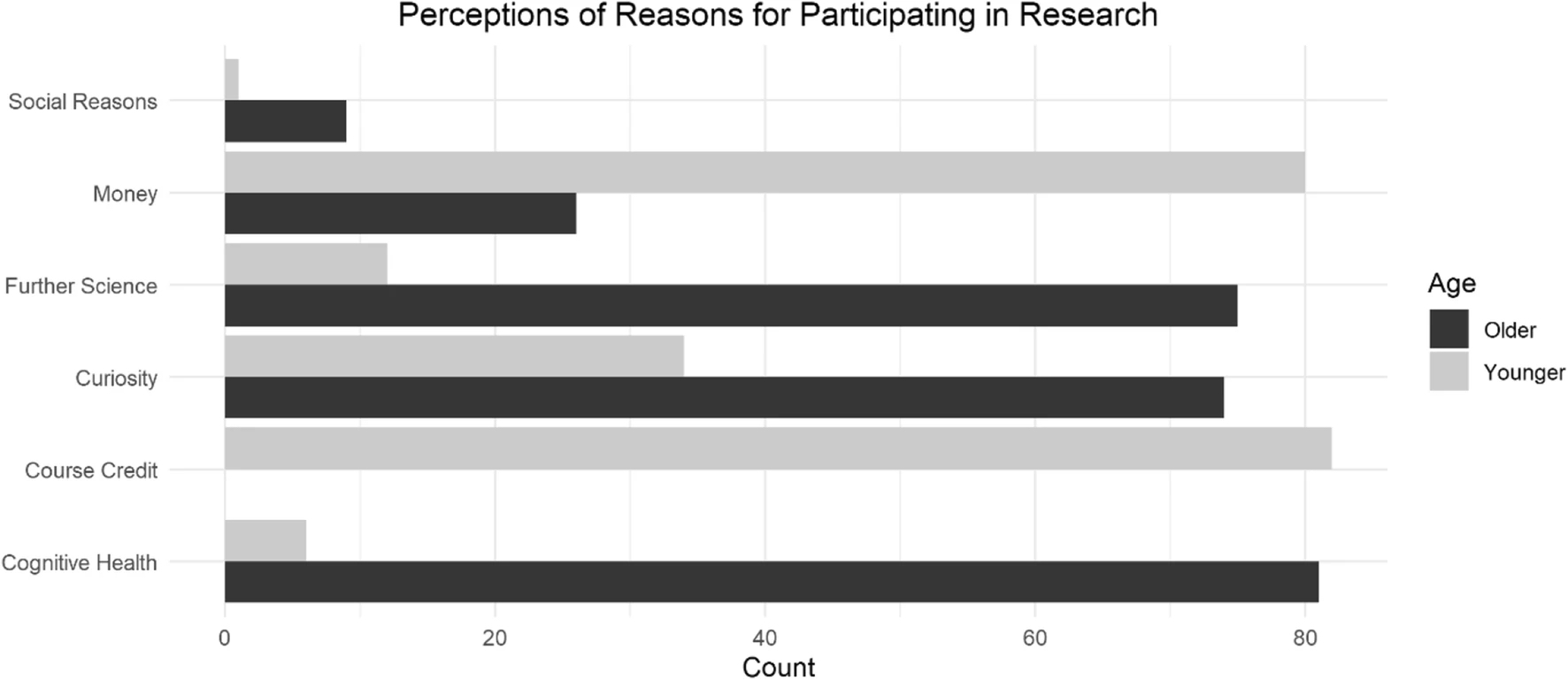Older adults are more motivated than younger adults to do well in lab studies.
What does this mean for our understanding of cognitive aging?
If you’re a psychologist who studies cognitive aging, chances are you recruit younger adults (18-22 years) from the college or university and older adults (65+ years) from the community and have them complete similar tasks. But these two groups of participants may decide to take part in research for very different reasons. For example, younger adults often participate in research for course credit, whereas older adults volunteer to take part out of interest, to contribute to scientific knowledge, and to learn about their own cognitive performance. Further, older adults are often more motivated to perform well in experimental tasks than their younger counterparts.
But there may be a dark side to this increased motivation for older adults. Specifically, older adults may be more susceptible to performance-related anxiety, which has the ironic effect of negatively impacting their performance. What could this mean for our understanding of cognitive aging? Researchers A. Dawn Ryan (Twitter) and Karen Campbell (Twitter; authors pictured below) discuss it in a recent article published in Psychonomic Bulletin & Review.

What motivates older adults in the lab?
Ryan and Campbell surveyed 88 cognitive aging researchers (mostly faculty in North America). The researchers were asked why they thought younger and older adults participated in research. Respondents thought that younger adults primarily participate to obtain course credit and for monetary compensation, whereas they thought older adults participate to get a sense of their cognitive health, to further science, and out of curiosity (see figure below). And, the respondents were much more likely to report that motivation to participate in research was higher for older adults than for younger adults.

Older adult research participants seem motivated by a desire to perform well. For example, in experimental studies, older adults report fewer task-unrelated thoughts than younger adults, and they are more likely to sacrifice speed in order to respond correctly on cognitive tasks than younger adults are.
Increased motivation to perform well leaves older adults vulnerable to stereotype threat
Although greater motivation to perform well is usually seen as a good thing, it may mean that older participants are susceptible to a phenomenon known as “stereotype threat.” Stereotype threat is worry related to confirming a negative stereotype about one’s group (e.g., all older adults have poor memory), which in turn interferes with task performance. Ryan and Campbell argue that this task-related worry may disrupt older adults’ performance in typical lab settings. In prior research, for example, simply telling older adults that a research study was focused on memory (rather than learning) was enough to negatively impact older adults’ recognition performance. But even studies that are not designed to investigate stereotype threat may affect older adults’ performance in the lab, and in turn, the conclusions we draw from such studies.
Implications for our understanding of cognitive aging
Older adults’ greater motivation to perform well, coupled with threat-inducing cues from the lab environment, may contribute to commonly observed effects in the cognitive aging literature. Stereotype threat may have the greatest influence on tasks that place high demands on executive control, highlight the fact that age comparisons will be made, and make explicit mention of memory testing.
For example, consider age differences in memory, which tend to be more pronounced when encoding and retrieval are intentional rather than incidental. This finding may partially be explained by the fact that incidental encoding tasks do not activate age-related stereotypes that can interfere with memory performance. In contrast, when encoding and retrieval are intentional (i.e., explicit), older adults may begin to worry about their performance, which then suffers as a result. Because these stereotype-driven demands exist for older adults but not younger adults, it may seem like memory declines more with age than it actually does.
Campbell writes, “Older adults’ greater motivation to do well in cognitive experiments may actually backfire, in that stressing out about how you are doing can distract you from the task at hand. Because of this, findings of age-related declines in memory may be exaggerated.”
To limit the influence of stereotype threat on older adults’ performance, Ryan and Campbell recommend recruiting more diverse and comparable samples of younger and older adults, carefully wording recruitment advertisements and experimental instructions, and conducting studies in natural settings (e.g., experience sampling where older adults can respond in their own homes). By designing studies that minimize the prevalence of stereotype threat, we can paint a clearer picture of the true cognitive changes that occur as we age.
Featured Psychonomic Society article:
Ryan, A. D., & Campbell, K. L. (2021). The ironic effect of older adults’ increased task motivation: Implications for neurocognitive aging. Psychonomic Bulletin & Review, 28, 1743-1754. https://doi.org/10.3758/s13423-021-01963-4
